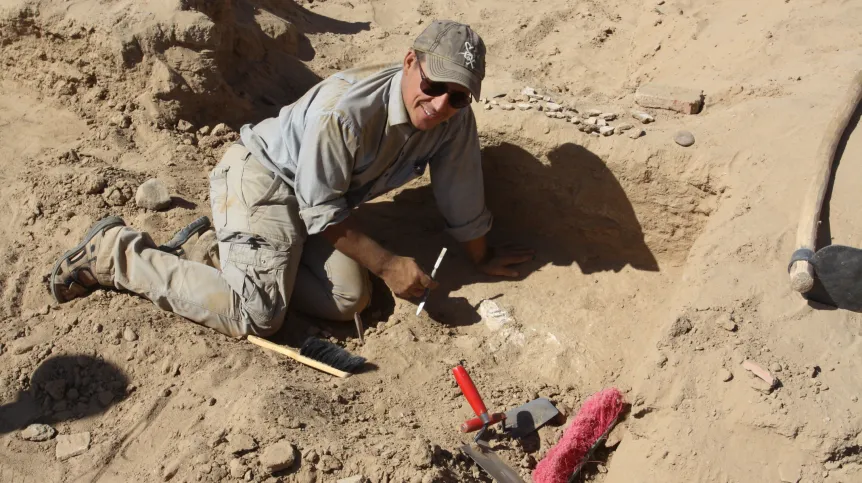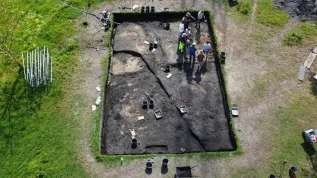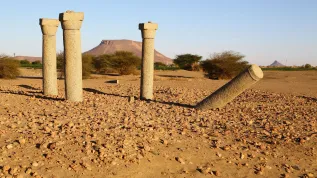
Maintaining the position, initiating transregional and interdisciplinary projects and promoting the achievements and legacy of the Research Station of the Centre of Mediterranean Archaeology of the University of Warsaw in Cairo - these are the priorities of director Dr. Artur Obłuski, who has just become head of the institution.
The Centre of Mediterranean Archaeology UW station was established in 1959. Its initiator was Prof. Kazimierz Michałowski, considered the founder of the Polish school of Mediterranean archaeology. Thanks to him, Polish archaeologists carry out research projects in Alexandria, and in the Temple of Hatshepsut in Luxor. Despite many difficult periods - political changes in both Poland and Egypt - the station has never suspended research activities.
Artur Obłuski replaced Dr. Zbigniew E. Szafrański, who was the station’s director since 2005. "This position is a great honour for me. I have great respect for the achievements of people representing the Polish science in Egypt: Prof. Michał Gawlikowski and Prof. Włodzimierz Godlewski. I also appreciate the work of my immediate predecessor, especially his management of the Station during the difficult time the last few years, which have not led to any damage to its operation" - noted Dr. Obłuski.
The main tasks of the Station include representing Polish archaeologists and conservators in Egypt and to ensuring the smooth progress of Polish archaeological missions in the country. The institution provides logistical services: cars for the Polish expedition, accommodation for the Ministry of Science and Higher Education scholarship holders and mission members, storage space. Its employees represent Polish researchers from several universities and institutes of the Polish Academy of Sciences in formal and legal issues, including authorization to conduct research.
"As an institution, the management of which was entrusted to me, is the research station, I intend to strengthen its scientific activities. History and culture of Egypt is an absolute priority. Here, we have celebrated success for years, including the discoveries of Prof. Karol Myśliwiec at Saqqara, Prof. Krzysztof Ciałowicz And Dr. Marek Chłodnicki’s mission in Tell el-Farkha. Together with Dr. Tomasz Waliszewski, head of the Centre of Mediterranean Archaeology UW, of which the station is part, I would like to complete the portfolio of projects carried out in Egypt with an archaeological and conservation project about Islamic culture" - said Dr. Obłuski.
The Station currently coordinates 17 field projects. In last year alone it hosted about 350 people. Among them were not only archaeologists and Egyptologists, but also epigraphers, geologists, geophysicists, biologists and Arab culture experts. The new Director intends to develop the interdisciplinary centre.
"Since the Station is the only such facility in the region, its doors are open for Polish scientists of various specializations. I wanted to emphasize that while the institution is part of the University of Warsaw, we are open to cooperation with researchers from other institutions. This has been the model of operating of the station for many years - some of the excavation missions are conducted by the University of Wrocław, Jagiellonian University, Adam Mickiewicz University in Poznań" - noted the director.
Projects, in which the Station participates, are not limited to excavations. In many cases, the crucial part is conservation work and making a monument available to visitors - as is the case with projects in the temple of Hatshepsut, Marina El-Alamein and Alexandria. Dr. Obłuski intends to support this trend.
The new director emphasized that very important during his term of office, which will last at least two years, will be establishing even closer relations with representatives of other scientific research stations in Cairo. The objective is to carry out international, large-scale trans-regional projects, studies of Egypt in the broader context. The Station also plans to organize a number of workshops and scientific meetings with foreign scientists.
The Station’s problem is financial instability. The Ministry of Science grant is awarded only for one year. "This is a very bad situation, because almost entirely hinders effective management and planning anything. Everywhere in the world annual funding has been replaced with multi-annual programs. In addition, this year the grant has decreased by 30 percent, which forces us to limit the activities" - said Dr. Obłuski.
The facility successfully obtains support for research work. This year, employees of the Centre of Mediterranean Archaeology of the University of Warsaw received 9 grants from the National Science Centre, most of which are related to the activities of the Cairo Station.
Cairo Station consists of two buildings in the Heliopolis district. First of them is leased since 1959 and the second bought in 1994 by the Foundation for Polish Science. Due to the lack of resources, they have not been repaired for years.
"If we want to maintain the presence of Polish scientists in Egypt, it is necessary to purchase a new building. Leasing is unprofitable. The possibility of termination by the owner destabilizes the Station - argues the new director. - Imagine the situation that suddenly 350 Polish scientists per year do not have a base for research. It would be a disaster, which is why I wish that the functioning of the station involves a lower risk."
Dr. Obłuski is open to cooperation with private patrons. "We would like to gain a strategic sponsor, with whom we would become associated for a long time. The money needed to support our operations is a fraction of the budgets spent by large companies on promotion through sports. Therefore, I appeal for help to those who have achieved success in business and would like to both literally and figuratively have their names written in gold letters in the history of Polish culture and science" - he encouraged.
Dr. Artur Obłuski is a graduate of Archaeology at the UW. In his scientific work he focused on the study of the origins of Christianity. He first came to Egypt in 1996, when he took part in excavations. In subsequent years, without abandoning scientific activities, he took a job in the Office of the Prime Minister. His responsibilities included management of EU projects. After 15 years he decided to devote himself entirely to science. He was a fellow of the Foundation for Polish Science Foundation and the De Brzezie Lanckoronski Foundation. He also carries out a scientific project at the Oriental Institute of the University of Chicago, and excavations in the monastery of Ghazali in Sudan.
PAP - Science and Scholarship in Poland, Szymon Zdziebłowski
szz/ agt/ mrt/
tr. RL













